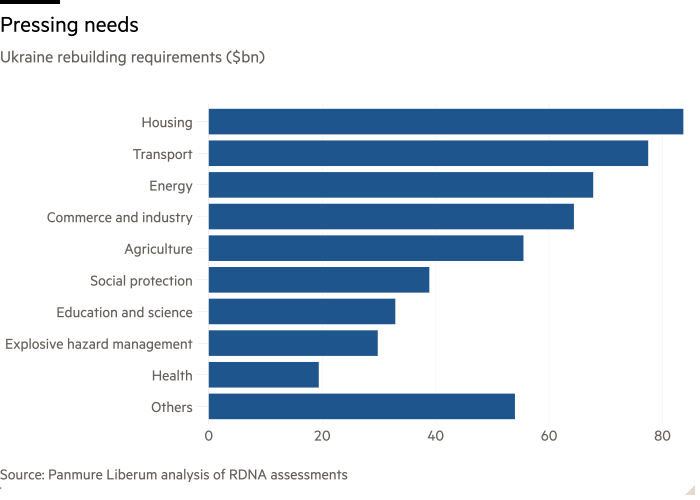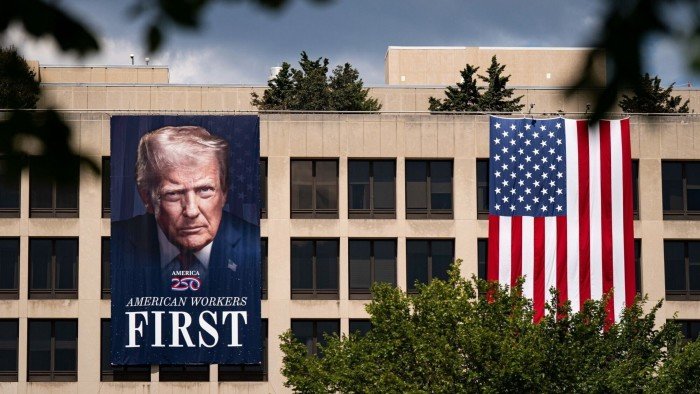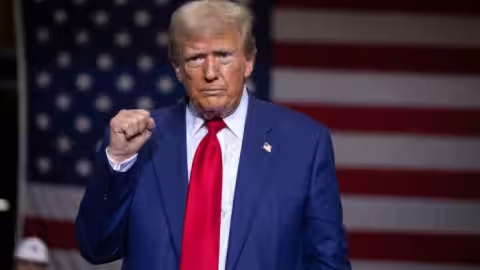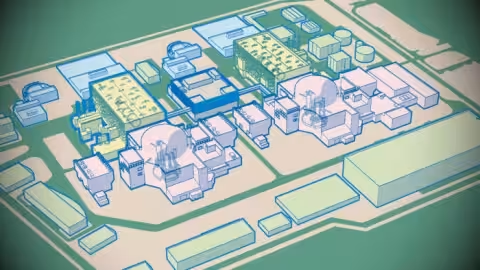Good morning.
Today, our Berlin correspondent reports on what the opening of Europe’s largest ammunition plant means for the continent’s rearmament push, and our Russia correspondent explains how Ukrainian strikes on Russian oil facilities are pushing up petrol prices.
Fully loaded
European rearmament is driving ahead at full speed, as Germany’s Rheinmetall yesterday inaugurated what will be the EU’s largest ammunition factory, writes Laura Pitel.
Context: Europe has been racing to dramatically expand production of 155mm artillery shells to supply Ukraine — and also boost the continent’s own stockpiles as a deterrence against Russia.
Nato secretary-general Mark Rutte attended the opening of the new €500mn facility in the town of Unterlüß, in Lower Saxony. Flanked by two large self-propelled howitzers, he praised the “extremely important” German arms maker.
Rutte warned that Russia and China were challenging the west by churning out weapons at an “incredible rate”, but also added that there was “real firepower and innovation” now coming out of defence companies such as Rheinmetall in Nato member states.
The Düsseldorf-based company has emerged as one of the biggest winners of Europe’s huge rearmament drive. It is gearing up for huge orders for tanks and armoured vehicles after conservative Chancellor Friedrich Merz unleashed unlimited borrowing to fund a huge increase in German defence spending.
Rheinmetall broke ground at Unterlüß in February last year and had hoped to build the factory in 12 months. Instead it took about 15 months to reach the point of starting test production a few months ago.
Chief executive Armin Papperger said that, despite the slight delay, it proved that Germany could be fast “when the conditions are right”.
The factory will initially produce about 25,000 artillery rounds this year, with the aim of reaching annual production of 350,000 in 2027.
Overall, the company makes around 700,000 artillery shells a year across different sites, including in other European countries. That is a hefty chunk of the European target of reaching 2mn a year, which Rutte said it was on track to meet by the end of 2025.
The company is planning to expand further: Papperger yesterday also signed a contract with Romania to build another €550mn ammunition factory there, and announced another project in Bulgaria.
Also present at the VIP-packed inauguration was German defence minister Boris Pistorius, fresh from a special cabinet meeting held at his ministry where ministers approved a new voluntary military service.
So too was vice-chancellor and Social Democrat co-leader Lars Klingbeil. Welcoming him from the podium, Papperger reminded the audience that as finance minister, Klingbeil was also the keeper of the nation’s purse strings.
“A very important point,” Papperger said with a grin. “Nice that you’re here.”
Chart du jour: Rebuilding
Ukraine’s reconstruction will cost an estimated $524bn over the next decade. With peace efforts tentatively under way, investors could start looking at how to get involved, writes Lex.
Crudo
Wholesale petrol prices in Russia reached record highs this month after Ukrainian drones severely damaged its oil refineries, leading to shortages in some regions, writes Anastasia Stognei.
Context: Ukraine recently increased the intensity of its attacks on Russian refineries, most of which are conveniently located in the country’s European part. Pressure was compounded by rising demand, as more people travelled by car due to rail disruptions and flight cancellations which were also linked to Ukrainian attacks.
Wholesale prices were up around 50 per cent compared with the start of the year, and Moscow has tried to rein in the rise by prohibiting all petrol exports until the end of September, expanding a previous ban.
While retail prices have risen more slowly than wholesale ones, some gas stations raised prices significantly. The Russian anti-monopoly authority began investigating some of them for “unjustified” price increases, but the effect of these measures has been minimal.
Russia has also raised its target for exports of crude oil to make up for the lacking refining capacities, according to a report by Reuters. But it’s unclear if those plans will materialise, as shipments have fallen in recent weeks owing to India purchasing less Russian oil amid pressure from the US.
Analysts however believe that the fuel crisis is not yet systemic or affecting the war effort, as the military machinery relies predominantly on diesel.
“The consumer market may face an unprecedented level of problems, but a full-scale fuel supply crunch — one affecting the army, transport and agriculture, and capable of disrupting the economy — is still distant,” said Sergey Vakulenko, a senior fellow at the Carnegie Endowment for International Peace.
What to watch today
-
EU defence ministers arrive in Copenhagen for dinner ahead of an informal meeting.
-
French President Emmanuel Macron hosts German Chancellor Friedrich Merz for dinner at his Brégançon residence.
Now read these
Are you enjoying Europe Express? Sign up here to have it delivered straight to your inbox every workday at 7am CET and on Saturdays at noon CET. Do tell us what you think, we love to hear from you: europe.express@ft.com. Keep up with the latest European stories @FT Europe























